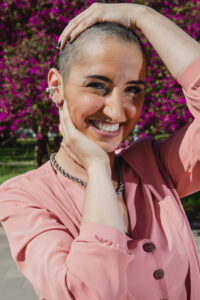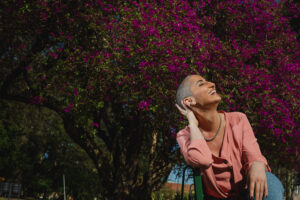The first thing that Brazilian broadcast journalist Alice Bastos Neves, 36, thought about when she was diagnosed with breast cancer was not pain, fear or even death, but losing her hair. "Before anything else I went to a wig store and tested how I was going to look. It was very empowering for me to have that wig, because it gave me the assurance that if I felt bad about my image, I could put it on," she said, in an interview with LatAm Journalism Review.
The story shows the preoccupation faced by the journalist, who is a presenter for Globo Esporte and a reporter for RBS TV, an affiliate of Rede Globo, about being confident with her appearance during treatment, especially in the workplace. And it gives even more strength and meaning to her decision, on Oct. 1, to share the diagnosis with the public, take off her wig and present the program with her head shaved. In short, to show herself as vulnerable.

Alice Bastos Neves, 36 anos, repórter da RBS e apresentadora do Globo Esporte. Foto: Marco Favero
She did it in a context that can be cruel to women. In television journalism in general and, mainly, in sports coverage, a macho view and a huge aesthetic demand on women journalists still prevails, she explains. Despite this, Neves chose to put aside the wig, which gave her security, in the name of a bigger message: raising awareness among the public about the importance of preventing cancer, empowering women who suffer from the disease and breaking beauty standards.
"We have become accustomed, mainly on television, to comply with a series of stereotypes and we no longer even know why we still obey them. It draws attention when someone presents like that, bald, or with their hair growing, because we don't see it. [.. .] On social media, everyone talks about breaking taboos and stereotypes every day. I found myself with an opportunity to do that, I thought I had to do it,” she said.
In addition to her decision to remove the wig, Neves launched a special series of reports, “Vitórias” (Victories), about women who overcame breast cancer with the help of sport. The series will be shown throughout the month, to mark Pink October, a month of awareness and prevention of the disease. Each year, more than 462,000 women are diagnosed with breast cancer in the Americas, according to the Pan American Health Organization. Below is LJR’s interview with Neves. It has been edited for length and clarity.
LatAm Journalism Review (LJR): You were diagnosed in January, just before a recording. How was it to continue working during treatment? Did you have to slow down a little? Because you already said in interviews that you are very active, right?
Alice Bastos Neves (ABN): [Laughter] Yes, girl, I am very active and very passionate about my work. When I was diagnosed, 2020 was an Olympic year, a very important year for people who cover sports. I didn't want to stop working. It is something that makes me feel good, a moment of pleasure, it is not heavy. I already imagined, there at the time of diagnosis, that continuing to work would strengthen me. When the need for chemotherapy came, I had an intense conversation with the company, with my family, to understand how I was going to do this. I thought it was fair to the public [to share the situation], also because chemotherapy creates many changes in appearance, which cannot be disguised. And I didn't want to disguise it. I think I was off of the program just a day or two.
LJR: Even during chemotherapy?
ABN: Yes, even during chemotherapy. It was not Globo Esporte, because in the pandemic the program went off the air, but we had a sports block inside the midday newscast, and I presented it from home. I was very happy because, during the pandemic and during chemotherapy, in addition to presenting in the newscast, I did a presentation about violence against women, about racism with Black athletes ... I was very active, and it was super positive. There were moments when I was really down and having that daily commitment, to put on makeup, feel better and present the program, was very good for me.
LJR: Do you think that experience has affected the way you did and do journalism?
ABN: In fact, it reinforced an idea that I already had, of not disconnecting sports from what happens with the rest of society. We [in the program] understand sport as an important social agent. So much so that we are now showing this series of TV reports, called Victories, which talks about women, professional or amateur athletes, who used the sport to face cancer. Sport is not just a team lineup, who won or lost, and the result. Sport moves people, and it’s good that we can use that to convey other important messages. In addition, from the moment I shared the diagnosis with people, they started to see me as someone who does not just talk about sports, but who has other experiences to share.
LJR: And now? Will you continue to present the program without a wig until your hair grows?
ABN: I'm already presenting it like this, directly. Forever and ever, amen. Now everyone is going to watch the hair grow, let's see what happens. 'No more' wig [laughs].

Alice Bastos Neves apresenta o Globo Esporte. Foto: Eduardo Rachelle
LJR: And in the street do you still wear a wig or have you stopped altogether?
ABN: So, girl, I stopped completely. In fact, when I heard about the diagnosis, the first thing I thought about was not necessarily pain, fear, chemotherapy, it was baldness. Before anything else I went to a wig store and tested how I was going to look. It was very empowering for me to have that wig, because it gave me the assurance that if I felt bad about my image, I could put it on. This is very funny: I think it is part of the way we were raised, of a series of stereotypes that society imposes on us.
Then, when I shaved it, it was a very light moment, in a very good mood. It was in the pandemic, my mother did it, we did it smiling. It was only emotional because my brother, who is in France, shaved his head as well [in a video call]. It was only then that I cried. I spent a few days with a strange feeling, looking at myself in the mirror with my bald head and thinking: 'Whoa, is this person me?' I only put on a wig to go to air on Globo Esporte. In life, for anything, I wore a turban.
LJR: Did you decide to take the wig off on TV?
ABN: Yes, it was a personal thing. Wigs require maintenance, I already thought it’s not working, it is laborious to care for. I had a conversation [with the broadcaster] and we chose to take it off with the launch of the series, to take the opportunity and send a nice message. In conversations with the team, many people understood that there was a question of strengthening other women who are going through this.
And there is another factor, which goes beyond the disease. We have become accustomed, mainly on television, to comply with a series of stereotypes that we no longer even know why we still obey. It draws attention when someone presents like that, bald, or with their hair growing, because we don't see it. It is the story that a woman has to be thin, she has to be this, that. On social media, everyone talks about breaking taboos and stereotypes all day long. I found myself with an opportunity to do that, I thought I had to do it. We talk about representation, but when we can really represent, we cannot miss the opportunity.

Alice conta que o esporte ainda é um ambiente machista. Foto: Marco Favero
LJR: Were you concerned that hair loss could affect your work in some way, considering the aesthetic demands on women TV journalists?
ABN: I didn't worry about it affecting the work, but how I was going to see myself that way. I find it very funny that people ask me: how do you have this self-esteem? My self-esteem is terrible, I'm super insecure, I think I'm ugly, strange, you know? I worried about how it would be to live with such a radical physical change. I heard a lot: it’s just hair, hair grows. Of course, but it is an important blow that we have to consider. Perhaps because I am a very optimistic person, I never thought I would die of it. I thought: I will do what I have to do and overcome.
LJR: You said you weren't wearing a wig anywhere else, just at work. Do you feel that, for a female television journalist, the workplace is where she is most concerned with appearance?
ABN: I think so. And even more in sport. Have you seen any sports presenter over 50, 60-years-old? In sports, the presenter has to be a girl, cute. This stereotype was created, we really need to fight it. It is difficult, because when we appear on TV every day we are very subject to judgments of all kinds. People talk about the clothes I'm wearing, lipstick, shoes, hair… It was determined that this is how it has to be [the standard of beauty], and when something doesn’t conform a little bit it ends up becoming news, which was the case of [my] little bald head. How many times have I seen people telling women presenters that they were overweight and needed to lose weight…
LJR: Sport is a more macho environment and this ends up being reflected in sports journalism...
ABN: Exactly.

Alice Bastos Neves on Instagram. Foto: Reprodução
LJR: At the end of the first report in the series, you tell women viewers that they "are beautiful in any style,” and put your hand on your head. Did you have many reactions to breaking this conventional pattern of beauty?
ABN: Many. There is a photo [on Instagram] in which I have no makeup, no eyelashes and no eyebrows. We talk a lot about hair, but losing eyelashes and eyebrows is much more difficult. And people said a lot that I had posted the real life. I am of the opinion that there is no real life on Instagram, what fits there is the part that we want to show. A colleague told me: 'What courage to expose yourself like that.’ And I had only put just a small portion of what this whole fight looks like.
LJR: In journalism there is a concern for the reporter and presenter to be neutral, objective, distant from the topic. You did the opposite. What was the importance of sharing the diagnosis with the public?
ABN: This thing about the presenter being absolutely neutral is not a rule that applies as strongly as it used to. More and more people understand that there is a human being there, who has their questions and opinions. Neutrality is very important, but our personal lives can add to the news being given.
LJR: In the case of the series Victories, in your opinion, did the fact that you were being treated impact the sources and the way the public views the reports?
ABN: I am still in treatment, three sessions of radiotherapy left [laughs]. One of the interviewees said to me: 'I never talked about it, I felt uncomfortable.’ And I asked, 'Why did you decide to speak now? She said, 'Because it’s with you, you know what I'm talking about.' This comes from the sources and the public, it has a lot of legitimacy when we talk about something we experience.

Alice apara o cabelo com mãe e filho. Foto: Arquivo pessoal
LJR: What is the importance of talking about cancer, which is still kind of taboo in society, for the general public, in a program that is usually light and positive?
ABN: My intention, when I was diagnosed, was to share it with people because of the change in appearance and then not to talk about it any more. But I started getting so many messages and requests from people to talk about it, that I started to understand that it was very important. When you have a disease like this, the support network is essential. The greatest lesson is to understand that we need one another in life, which can be the doctor, the mother, the brother, the son. Or it could be the more distant other, the viewer who sends you a message and changes your life, or the presenter who takes off the wig. I started to understand how valuable these exchanges were and they strengthen [us]. And breaking this taboo of cancer involves awareness and prevention. We need to talk so that more people have the chance to face this in the best possible way and for cancer to stop being synonymous with death.